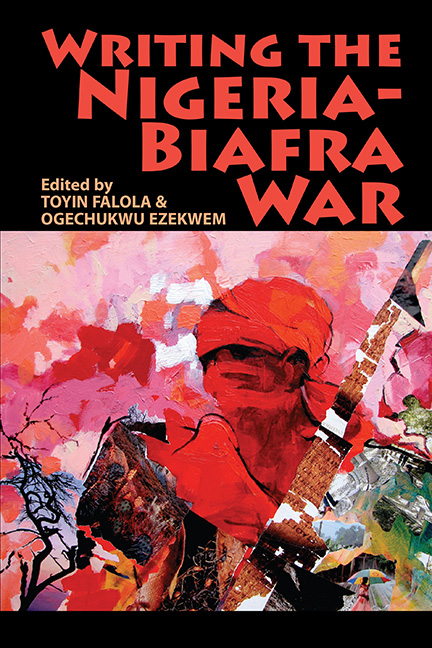Book contents
- Frontmatter
- Contents
- Notes on Contributors
- List of Abbreviations
- Timeline
- Map of Biafra 30 May 1967 – 1 May 1969
- 1 Scholarly Trends, Issues, and Themes: Introduction
- Part I On The History Of The Nigeria-Biafra War
- Part II Critical Debates On The Nigerian Crisis
- Part III The War In Fiction, Memoir, And Imagination
- Part IV Locating Gender In Nigeria-Biafra War Literature
- Select Bibliography
- Index
3 - Connecting Theory with Reality: Understanding the Causes of the Nigeria-Biafra War
Published online by Cambridge University Press: 17 June 2021
- Frontmatter
- Contents
- Notes on Contributors
- List of Abbreviations
- Timeline
- Map of Biafra 30 May 1967 – 1 May 1969
- 1 Scholarly Trends, Issues, and Themes: Introduction
- Part I On The History Of The Nigeria-Biafra War
- Part II Critical Debates On The Nigerian Crisis
- Part III The War In Fiction, Memoir, And Imagination
- Part IV Locating Gender In Nigeria-Biafra War Literature
- Select Bibliography
- Index
Summary
Introduction
The Nigeria-Biafra War (1967–1970) was a defining event in the history of postcolonial Nigeria. Nigeria's independence in 1960 marked the beginning of attempts to build a strong, united, and prosperous nation in Africa's most populous pluralistic country. Yet the tension arising from the conflicting interests and aspirations of the country’s diverse ethnic groups intensified. The British had made little effort to unite the different ethnic groups in a collective consciousness during the colonial period. Its indirect rule system of administering Nigeria undercut any chances of promoting social solidarity among various ethnicities. Worse still was that the forced amalgamation of the Northern and Southern Protectorates of Nigeria in 1914 was not successful in narrowing the entrenched historical, cultural, and religious differences in the country. Due to the mistrust and fear of domination and deprivation that dominated Nigeria's politics during the colonial period, it was only a matter of time before the country's fragile unity would be tested. That test came at independence. The inability to resolve the disagreements between the federal government, headed by Lieutenant Colonel Yakubu Gowon, and the Eastern Region, headed by Lieutenant Colonel Emeka Ojukwu, compelled the latter to secede from Nigeria by proclaiming the independent Republic of Biafra on May 30, 1967. Swiftly, the federal government declared a war designed to keep the county together. A civil war ensued, lasting from July 6, 1967 to January 15, 1970.
One of the subjects of unending scholarly debates about the Nigeria-Biafra War has been its causes. Much of the scholarly writing on the causes of the war has taken a narrow view of the war, often inspired by loyalty to an ideology or ethnic group. This chapter applies the theories of societal conditions, economic conditions, and human nature as explanatory frameworks to analyse the dynamic and complex causes of the war. Through analysis of mostly primary sources acquired from the National Archives, London (UK), this chapter argues that the Nigeria-Biafra War represented a predictable convergence of domestic mistrusts and rivalries that British colonial rule consolidated with broader neocolonial British interests that the Cold War era politics facilitated. The war was a logical manifestation of unaddressed ethnic tension that typified Nigeria's colonial society. It shows that even after achieving political independence, the tension refused to disappear but was rather sharpened, making war inevitable.
- Type
- Chapter
- Information
- Writing the Nigeria-Biafra War , pp. 40 - 61Publisher: Boydell & BrewerPrint publication year: 2016

